5503
Views & Citations4503
Likes & Shares
Tourism can be introduced as a "labor-intensive industry that creates huge employment opportunities for both skill and unskilled labor from both urban and rural areas” (Kobra et al., 2018). According to (Kobra 2018) tourism is the only industry that creates employments from coastal areas to hill areas in a country towards human capital development and their earnings. Tourism is appeared in various forms based on the nature of the tourist's experience. This study is supposed to define the concept of Agro-Tourism towards sustainability. In the literature, Agro-tourism is defined as a form of ecotourism, as well as a component of rural tourism. International Conservation Union (IUCN) defines ecotourism as: "Environmentally responsible travel and visitation to natural areas, to enjoy and appreciate nature (and any accompanying cultural features, both past, and present) that promote conservation, have a low visitor impact and provide for beneficially active socio-economic involvement of local peoples" (CeballosLascuráin& Héctor, 1996). The term "Rural Tourism" has not given a proper definition, but it has been defined in several ways and according to the European Commission, the term "Rural Tourism" is adopted as “tourism in areas with a low density of population” (European Commission, 2000).
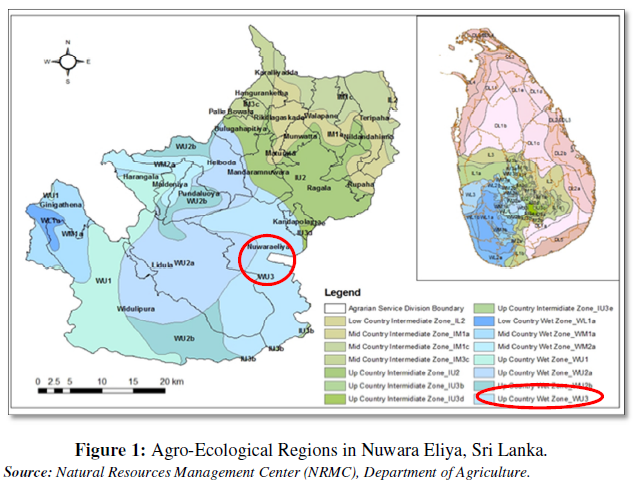
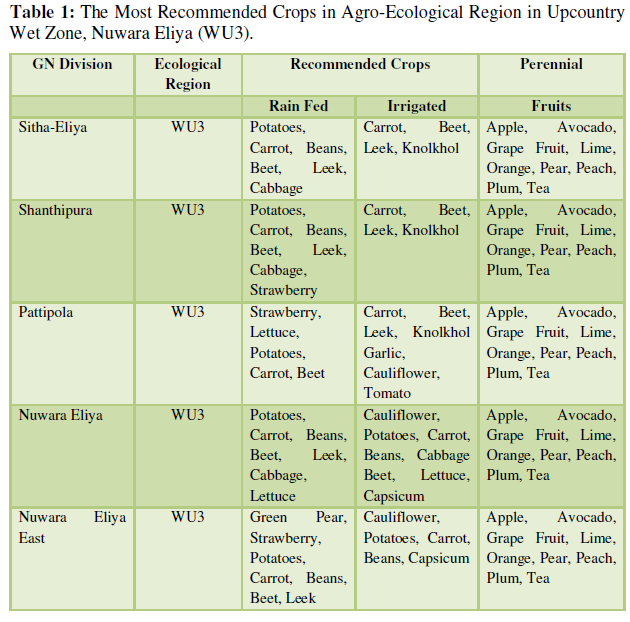
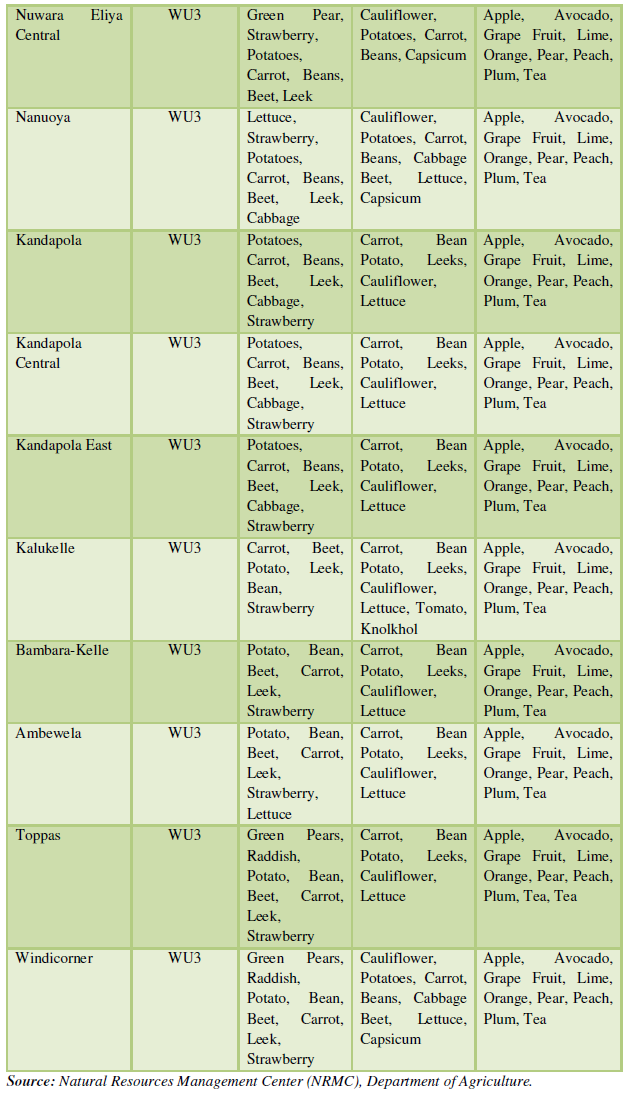
According to the Assessment of Agricultural Water Pollution in Nuwara Eliya done by the Post Graduate Institute of Agriculture, University of Peradeniya, Sri Lanka, has pointed out Environment-related governmental organizations and their specific activities towards the sustainability of the environment in Nuwara Eliya (Henegama et al., 2013).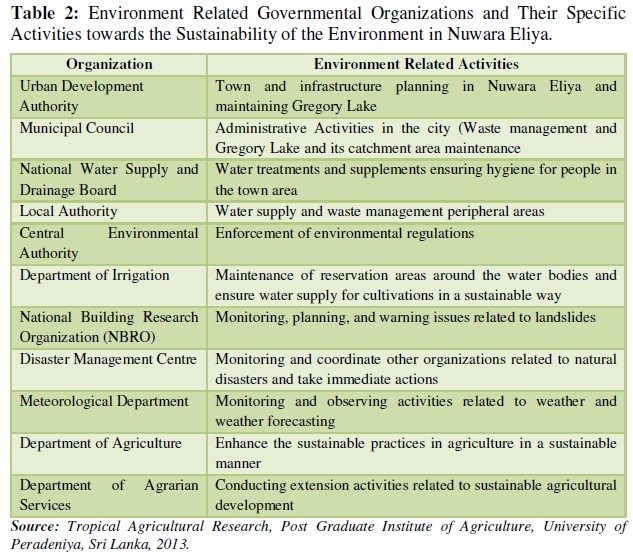
According to (Table 2) the efforts of the governmental organizations towards the sustainability of the environment and agriculture are appreciated. As explained by (Graham,2002). the less institutional capacity of addressing problems is a major reason for the poverty of the countries. As well, the lack of institutions that can sustain the economic policies and failures of development efforts are major issues in most countries such as Sri Lanka (Graham, 2002) cited in (Khan et al. 2020). However, considering agro-tourism practices at the present, the mediation and contribution of SLTDA and Tourism Promotion Bureau are not satisfactory. In the present scenario, these both responsible tourism authorities do not maintain favorable institutional relationships, coordination, and cooperation with other subjective bodies, especially are Department of Agriculture, the Department of Agrarian Services, and the Department of Irrigation in the process of developing industry of agro-tourism practices in Nuwara Eliya. Though certain ecotourism practices are undertaken with the participation of government and the private sector, agro-tourism is yet to be promoted as a part of it. Agro-tourism would be beneficial for the government to use as an economic strategy to upgrade the agricultural industry, quality of lives, the economy of ground-level communities that are involving in small-scale agricultural livelihoods related to vegetable and fruit farming, animal farming, and also fishing. According to the above Principle No. 5 which "Sustainable food and agriculture require responsible and effective governance mechanisms" would be achievable through the active participation and the contribution of the government and its responsible authorities to promote Agro-tourism in above mentioned agro-ecological regions in Nuwara Eliya, however currently mal-functioned.
Considering the current practices of agro-tourism in the Nuwara Eliya area, Pattipola and New Zeeland farm is operated as agro-tourism destinations. The population of Pattipola GN division is around 1726 and 90% of this population is occupied in agriculture-related livelihoods. Pattipola Strawberry farms are popular among tourists who enjoy agro-tourism. Hereby, tourists can join with Mushrooms, Potato, and fruit cultivation along with animal husbandry. Dairy and poultry farming are recently established in this destination under the project of "Divi Neguma" initiated by the Sri Lankan Government. Exotic fruits such as Strawberries, Oranges, Passion Fruits, Lime, Guava, Lemon, Peaches, Tomatillo, Locket, and Apples are cultivated at the commercial level to attract tourists. As well, Ambewela New Zealand Farm is also currently operated as an agro-tourism destination. Around 766 people are living in the Ambewela GN division and the majority of these villages are engaging in farming activities. Fruit and flower farming are practiced by the people in this destination in addition to dairy farming (Rambodagedara et al., 2015). These are the most prominent agro-tourism sites which are currently operated in Nuwara Eliya. However, these practices are inadequate to gain from agro-tourism for the community who are involving in agriculture in Nuwara Eliya. Therefore, the benefits of sustainable agriculture will not be equally distributed among stakeholders at the present. The majority of benefits of the agriculture sector are entertained by the large-scale business community while the small-scale farming community is being under-stressed and mal-functioned. Hereby, the traditional and rural Tea Pluckers are completely forgotten and cornered by the current practices of Agro-Tourism while the tea estates in remote areas are under-utilized in Nuwara Eliya. Consequently, Principle No. 3 of sustainable agriculture would be spoiled through the current practice of agro-tourism in Nuwara Eliya demonstrating inequality of income distribution towards rural farming people.
According to Table 1, the majority of potential destinations have been unemployed in the current practices of agro-tourism in Nuwara Eliya. Above mentioned agro-ecological regions which are currently recognized as tourist destinations are not efficiently employed in the current practices of agro-tourism except Pattipola and Ambewela. The government and other authorities have not paid proper attention towards high potential villages such as Kandpola, Sitha-Eliya, Nanu Oya that can be promoted as agro-tourism destinations at the industrial level. Consequently, industrial and organizational capacity and efficiency of agro-tourism have been diminished in Nuwara Eliya as previously explained by (Graham, 2002).
Toppas and Windicorner are comparatively attractive destinations were situated at the entrance to Nuwara Eliya which is currently faded and covered with commercial advertisement banners. Therefore, these cultivations are not properly seen by the visitors who enter Nuwara Eliya. Principle No. 4 which is enhancing ecosystems is violated in this area by the people who are establishing vegetable stoles unnecessarily covering cultivations in this destination. Therefore, this area has become a noisy place crowded with sellers and hotel buildings. According to the above Table 1, Nanu Oya is an ideal place for converting into an agro-tourism destination since Nanu Oya station is the most important access point in Nuwara Eliya with the railway station. Moreover, Nanu Oya is an important viewpoint in Nuwara Eliya which tourists can observe various natural sceneries including waterfalls, rivers, tea estates, mountains, valleys, etc. upon arrival. However, this significant agroecological destination is currently unemployed in agro-tourism in Nuwara Eliya. Therefore, these three places which are Toppas, Windicorner, and Nanu Oya should be promoted for agro-tourism in Sri Lanka since every tourist who visits Nuwara Eliya is passing through these agricultural areas before entering the city.
Shanthipura is a famous and most popular viewpoint which is situated on the way to Nuwara Eliya city moving through Toppas and Windicorner. However, people who visit this site do not experience Agro-tourism though it is being an agroecological destination that is enriched with various fruits and vegetables that can be tasted by the tourists. Currently, this destination is paid attention by the authorities only as a viewpoint, but as an agro-tourism site.
Further, Green Pear and Strawberries are high returned income generated crops grown in Ambewela, Toppas, Kandapola, Kalukele, and Nuwara Eliya which are currently not focused on by agro-tourism in Nuwara Eliya. Therefore, these cultivations are discouraged in the local commercial market due to the higher cost of production and purchase. Therefore, farmers do not encourage in cultivating such high-return crops since they are not able to spend much on them.
Nuwara Eliya city is the heart of the central province as the most popular tourism destination. However, the agricultural value of this region is limited for commercial purposes despite its agro-ecological features that can be important in agro-tourism. The rapid establishment of concrete buildings in this city diminishes the ecological and environmental values of the agricultural sites around the city area. Therefore, farmers who are dedicated for cultivate these urban sites are not gained by agro-tourism in Nuwara Eliya violating Principal No. 3 which sustaining the livelihoods, equity, and social well-being of these farming people. They are not gained by the tourism and sad stories of their lives are covered by the commercial purposes of businesses and industries. Their lives are hardly sustained through commercial agriculture in Nuwara Eliya. As well, these farmers are not effectively and efficiently used in the industry of tourism to promote agro-tourism in Nuwara Eliya demoting Principle No. 1 which “Improving efficiency in the use of resources is crucial to sustainable agriculture”. Therefore, the agriculture industry will not be sustained by the industry of tourism in Nuwara Eliya.
Principle No. 2 which “Sustainability requires direct action to conserve, protect and enhance natural resources” is often violated through this commercial agriculture since they are using chemicals and pesticides for rapid harvesting of the crops without using biochemicals. As well, this practice will spoil Principle No. 4 which is based on the sustainability of ecosystems related to agriculture. Hence, several agro-friendly worms, insects, animals, flora, and fauna are being endangered by using pesticides and weedicides.
According to the Environmental Audit Report, no: PER/B/2019/02 by Environmental Audit Division, National Audit Office, Sri Lanka, the environmental effect of using pesticides is mentioned as follows.
Table 3 shows the direct effect of pesticides on environment-friendly flora and fauna. Further, pesticide contamination of soil, underground, and surface water will cause negative impacts on society. If these practices would continuously occur, the ecosystems which are useful for protecting environmental balance will be destroyed. Therefore, sustainable agricultural methods should be adopted while promoting agro-tourism as a part of it.
Further, the farmers working in existing commercial farmlands and other small-scale farmlands do not care about environmental sustainability. Therefore, ecological devastations such as soil erosion, water pollution, and air pollution have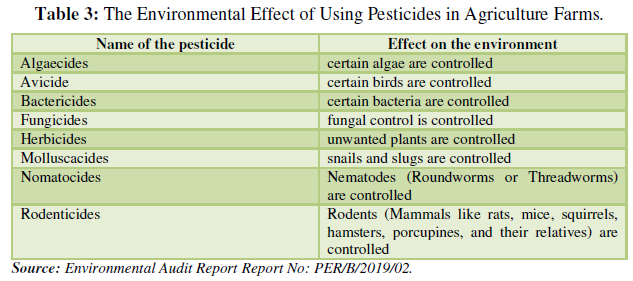
been increased due to the use of chemicals and other artificial materials used in farming. Consequently, existing farming sites such as Kandapola, Nuwara Eliya, Toppas, Windicorner, Sitha Eliya are not attracted by the tourists who are appreciating ecological values. Environmental pollution especially occurred by commercial farming is negatively affected by ecological sustainability defined under Principle No. 4 of sustainable agricultural principles introduced by FAO.
The above review is emphasized that the sponsorship of the government and other authorized bodies for promoting agro-tourism is not satisfied. Therefore, most of the high potential agricultural resources and destinations are being under-utilized in the industry of agro-tourism due to the inefficiency of responsible authorities related to the tourism and agricultural sector in Sri Lanka. Further, the coordination failures between authorities, middle-level, and ground-level stakeholders are not enough strong to expand and develop agro-tourism in Nuwara Eliya. Hereby, the relationships among tour operators, hoteliers, and farmers have not been satisfactorily entertained in the current practices of agro-tourism. Farmers are not properly aware of this particular industry and they do not have a clear idea about the gains from agro-tourism in their day-to-day lives. Sustainable interactions and relationships between farmers and foreign tourists are not sustained by the language barriers. Local tourists are comparatively discouraged to experience agro-tourism than foreign tourists due to their negative attitudes regarding farming people and poor appreciation of indigenous farming communities. Therefore, the local market towards agro-tourism is hard to develop in Sri Lanka.
Above mentioned problems, deficiencies, and barriers of current practices in agro-tourism will be addressed in the next section providing suggestions and recommendations. The next section will provide a conclusion for this study while examining opportunities and possibilities in Nuwara Eliya to promote agro-tourism as an important part of sustainable tourism in the future.
CONCLUSIONS AND IMPLICATIONS
Sri Lanka is an agricultural country that is enriched with a sound cultural background focused on agriculture. As a modern trend, most countries are using agriculture to promote the tourism industry introducing agro-tourism. The term "Agro-tourism" is derived from "Rural Tourism" to sustain agriculture in rural areas while conserving eco-cultural resources and making benefits for the rural farming people by using tourism. Currently, Nuwara Eliya, Sri Lanka is an ideal agricultural destination that can be developed as an agro-tourism paradise as is a part of sustainable tourism practices. Therefore, this study examined the possibilities and potentials in the Nuwara Eliya area to promote agro-tourism adhering to the “Five Principles of Sustainable Agriculture” introduced by FAO. In this process, this research selected the most applicable 15 GN divisions which are recognized as Agro-Ecological Regions in Nuwara Eliya by Natural Resources Management Center (NRMC), Department of Agriculture, Sri Lanka. The majority of these sample destinations are currently operated as ecotourism destinations in Nuwara Eliya. The provincial restrictions imposed due to the COVID-19 pandemic were major limitations in this study for gathering primary data and field visits in the process of data collection. Hence, this research is composed of secondary qualitative and quantitative data and information extracted from archival research by using books, journals, research papers, articles, annual reports, and recently updated official websites related to the subjective disciplines. Hereby, a comparative analysis was carried out based on “Five Principles of Sustainable Agriculture” to investigate the problems, shortages, and deficiencies in current practices of agro-tourism in Nuwara Eliya.
As a result of the analysis, the study revealed that growing eco-cultural potential for agro-tourism can be found in Nuwara Eliya associating a variety of crop production. However, these resources are not properly managed and efficiently utilized by the current practices of agro-tourism due to the mal contribution, cooperation, and coordination of related governmental bodies especially, SLTDA, Tourism Promotion Bureau, Department of Agriculture, Department of Agrarian Services, and Department of Irrigation. The current agro-tourism practices operated in Pattipola and Ambewela are not sufficient to satisfy the global demand for agro-tourism in Nuwara Eliya. As well, the benefits of these practices are not equally distributed among farming people in Nuwara Eliya since the majority of areas are not favorably utilized by the agro-tourism operations towards social welfare. Moreover, the high usage of pesticides, fertilizer, and chemicals by the commercial agricultural farms in Nuwara Eliya is directly threatening to the sustainability of the environment and eco-systems. Poor knowledge and awareness of the stakeholders regarding the industry of agro-tourism, language barriers between foreign tourists and farming people are drawbacks for the development of agro-tourism in Nuwara Eliya.
Considering the future implications of this study, agro-tourism opportunities and potentials revealed in this study will be helpful to find new directions towards sustainable agriculture and tourism developments for the responsible authorities related to agriculture and tourism. Therefore, the indications and recommendations of this study would make mutual benefits for the agricultural sector and tourism sector at the commercial level in Sri Lanka. Further, this study will provide practical ideologies for future entrepreneurs who are willing to engage in tourism based on their agricultural background. As well, the implications of this study would deliver exceptions to extend the sustainable tourism practices while broadening the benefits for the farming community in the rural areas in Nuwara Eliya to upgrade their livelihoods while empowering rural women. Finally, it would provide a new approach and opportunity for the Eco-tourists who are experiencing and studying tropical agricultural patterns at a single ground at Nuwara Eliya sustaining the dimensions of the tourism industry in Sri Lanka.
RECOMMENDATIONS
Implementing sustainable tourism policy reforms
Sri Lanka tourism industry is still operated under the Tourism Act No. 38, 2005. Compared to emerging world trends of tourism, the existing act should be amended and tailored according to the various dimensions of current tourism practices especially for ecotourism composed with agro-tourism, rural-tourism, etc. introducing sustainable tourism approaches and opportunities to the stakeholders. Under these acts, the government can execute rules and regulations over environmental protection and cultural identities as an action towards eco-cultural conservations.
Establishing efficient coordination and corporation between subjective governmental bodies in the industry
Considering agro-tourism promotions in Nuwara Eliya, it is important to implement formal coordination between the Department of Agriculture, Department of Agrarian Services, Department of Irrigation, and Hotel Corporation with the affiliation of SLTDA and Tourism Promotion Bureau. The information, commands, and directions transmitted by these authorities should be reached by the farmers at the bottom level via hoteliers in Nuwara Eliya. Hereby, this mechanism should have a proper flow of information and commands from top to bottom as well bottom to top as follows (Figure 2).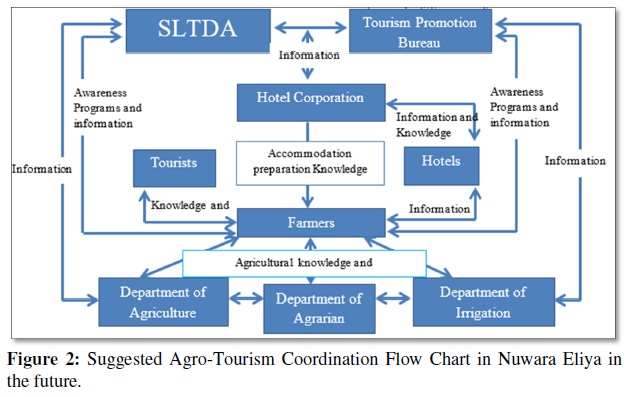
According to (Figure 2). the awareness programs, knowledge, and technology provided by tourism and agricultural authorities towards hoteliers and farmers will be returned as information for the authorities while experiences are entertained by tourists as feedbacks. Therefore, coordination and corporation between stakeholders are important to enhance the effectiveness and efficiency of the agro-tourism industry in future Nuwara Eliya.
Efficient use of Agro-Ecological regions as agro-tourism destinations
Department of Agriculture has identified 15 GN divisions in Nuwara Eliya area as agro-ecological regions. Therefore, there is a high potential of establishing agro-tourism sites by using these regions. Hereby, currently, Strawberry farming regions such as Shanthipura, Nuwara Eliya East and Central, Nanu Oya, Kandapola, Kalukelle, Bambarakelle, Toppas, and Windicorner can be promoted as Agro-tourism based Strawberry farms in addition to Pattipola. Hereby, the rural farming people in Shanthipura, Nanu Oya, Kandapola, Kalukelle, and Bambara Kelle could be joined to enhance the sustainability of agriculture while generating income through agro-tourism in Nuwara Eliya. As an initial step government can grant financial capital for these people to initiate strawberry farming at a commercial level for the tourists who come to Nuwara Eliya. In addition, Windicorner, Toppas, Nuwara Eliya East, and Central can be developed as Green Pear farming destinations for tourists who are willing to enjoy agro-tourism. Hereby, Strawberry and Green Pears can be promoted as high-income generated crops in Agro-tourism. Further, small tea estates located in rural and remote areas in Nuwara Eliya can be promoted as agro-tourism destinations to experience world-famous Ceylon tea culture for the visitors. Hereby, all the selected agro-ecological regions could be promoted for tea-tourism under the concept of agro-tourism in Nuwara Eliya.
Agricultural product diversification in Agro-tourism sites
In this process perennial crops such as Apple, Avocado, Grape Fruit, Lime, Orange, Pear, Peach, and Plum can be promoted in agro-ecological regions in Nuwara Eliya in addition to vegetable farming. Hereby, the agro-tourists will be able to experience a high range of crops in agro-tourism destinations in Nuwara Eliya. The remote rural areas such as Pattipola, Kandapola, Kalukelle, Bambara Kelle destinations can be utilized for animal husbandry using Cows, Goats, Horses, and Hens, since there are more spaces and meadows available with natural water resources. Consequently, agro-tourists would be able to enjoy and experience traditional animal husbandry methods additionally traditional crop agriculture in Nuwara Eliya.
Human resource development through Agro-tourism
Travel, and tourism provide more opportunities for human resource development while allowing women to workforce participation, leadership, entrepreneurship, and empowerment than other sectors. It reduces poverty in rural communities while generating benefits at both the micro and macro levels in rural areas (Bazazo, et al., 2017) cited in (Kobra, et al., 2019). Therefore, agro-tourism associated with flower farms in Nuwara Eliya would be a great opportunity for women to join and contribute to the tourism industry while earning benefits. Hereby, women's participation in tourism could be enhanced through agro-tourism while empowering the women towards leadership and entrepreneurship through flower and vegetable farming including tea in Nuwara Eliya. Further, small stalls could be established in agroecological regions where tourists could taste processed Fruit Salads, Fruit Juice, Vegetable Salads, Fresh Milk, and Tea, etc. at a reasonable controlled price. Hereby, the concept of “Hela Bojun” conducted by the Sri Lankan Government could be further promoted and expanded in these agro-tourism regions focusing on rural areas to empower rural women, promote youth employment, and gender equality. It would be beneficial to income generate for rural communities and promote employment opportunities for the rural people as self-entrepreneurs.
Agro-tourism activity product diversification
Agro-tourism activities are limited in the current practices in Nuwara Eliya at the present. Therefore, agro-tourism activity product diversification would be important to expand this industry. Hereby, Fruits and Vegetable plucking, harvesting can be introduced associating fruits and vegetable farms while providing opportunities for tea plucking for the tourists in rural tea estates in Nuwara Eliya. Milking cows, feeding animals, horseback riding around rural areas can be promoted around suggested animal farms in Pattipola, Kandapola, Kalukelle, and Bambara Kelle. Horseback riding will be interesting since tourists could be able to observe and feel the nature and the climate in Nuwara Eliya, especially in village areas. Hereby, tourists can observe the behaviors of animals while experiencing the village culture. Tourists can visit organic farms using traditional agricultural methods and join with seed harvesting in rural farms. Further, tourists would have the knowledge and experience of tea culture in Nuwara Eliya through the activities of visiting small-scale tea factories joining with traditional Tea Pluckers. Homestay with farm-to-table dining activities would be a most enthusiastic event for the foreign tourists in Nuwara Eliya as it allows tasting traditional foods while experiencing village lifestyles enriched with agriculture. These activities will provide educational and interpretational knowledge to the tourists regarding agriculture in Sri Lanka.
Introducing and promoting organic farming methods
Organic farming is important in promoting agro-tourism since it appreciates the sustainable survival of the environment and ecosystems. Therefore, introducing and promoting organic farming methods are essential in Nuwara Eliya. Organic farming will be beneficial for the environment, ecosystems, wildlife, farmers as well as consumers. Hereby, people can be encouraged to use compost to produce natural fertilizer reducing soil carbon losses, soil erosion, and water pollution. Organic fertilizers can be prepared by using natural sources such as livestock and poultry excreta, plant remains, biogas, and agricultural by-products. Adhering to these processes, organic tea, fruits, and vegetables can be promoted under the organic farming system in the agro-ecological regions in Nuwara Eliya. Consequently, sustainable qualities of agro-tourism will be enhanced through these practices in the future.
Inaugurating awareness programs for the stakeholders
In the process of promoting agro-tourism in Nuwara Eliya, the awareness programs should be launched in two specific ways. First, people should be aware of the attitudes and ethics of sustainable tourism practices. Hereby, workshops focused on farming people could be organized demonstrating the way of greeting, welcoming, treating, respecting, and dealing with the tourists who visit their farmlands. As well, positive attitudes should be fed into the minds of the farming people regarding the benefits that they can earn through sustaining agro-tourism. Secondly, hoteliers and farming people should be aware of the “Five Principles of Sustainable Agriculture” since these principles would help the farmers to enhance the sustainability of their farmlands. On this basis, awareness programs could be launched with the participation of SLTDA, Tourism Promotion Bureau, and NRMC along with the Department of Agriculture.
Facilitating technology for farming people
In the field of agriculture, technology is important to enhance its efficiency and effectiveness. In the case of agro-tourism farmers should be introduced sustainable methods of using technology. Hereby, introducing Digital Sensors are important to collect micro-climate data, measure the precise Ph level of the soil, and ensuring the sustainability of the products. Wireless Remote Irrigation Monitoring System is another sustainable technology that is enabling irrigation practices more efficient and sustainable. As well, Drones can be used as a tool for monitoring crop growing conditions. Moreover, Biotechnology will be useful to introduce more fast and precise breeding methods to the farmers. In the process of technology facilitation, government and related bodies such as the Department of Agriculture should contribute by providing agricultural loans for the farmers as a part of technology facilitation. Further, in the process of introducing technologies, the Meteorological Department and Department of Irrigation could be contributed.
Providing knowledge and education for the stakeholders
Knowledge and education regarding agro-tourism should be primarily given to the farmers and related communities. Hereby, farmers should be aware of the inter-relationship between tourism and agriculture and how this relationship about to be sustained through the interactions between farmers, tourists, and other responsible parties. In addition, the Department of Agriculture could share knowledge regarding sustainable agricultural methods, water management, and its practical usage towards environmental sustainability while serving tourists at their farming premises. Further, SLTDA and Tourism Promotion Bureau could guide the farmers to establish eco-friendly accommodations for the tourists to lodging with them and sharing agricultural experiences. It is important to launch foreign language training programs for the farming people for the basic communications with the foreign agro-tourists since language barriers are uncomfortable for maintaining inter-relationships sharing experiences between tourists and farmers.
Monitoring and certification of agro-tourism activities
Agro-tourism certification criteria should be granted for the agro-tourism practices in Nuwara Eliya based on “Five Principles of Sustainable Agriculture”. In this case, the agro-tourism activities that are undertaken by the rural and farming people should be monitored by the responsible authorities even on monthly basis to ensure the quality and sustainability of the practices and their products supplied to the visitors. On this basis, special certificates and awards could be offered for the top-ranked agro-tourism practices to encourage the farming people to maintain the certified sustainable qualities of the industry. This kind of program could be initiated by SLTDA and Hotel Corporation incorporating the Department of Agriculture and Central Environmental Authority in Sri Lanka.
- Arias Segura, J. (2010). The contribution of agriculture to sustainable development in Jamaica. Inter America Institute for Cooperation on Agriculture San Jose Costa Rica San Jose Costa Rica. Available online at: http://repiica.iica.int/docs/b2082i/b2082i.pdf
- Byne, E.G. (2004). The Leaders of Georgia Agritourism a Qualitative Study Master’s Thesis the University of Georgia Athens Georgia. Available online at: https://getd.libs.uga.edu/pdfs/byne_edmund_g_201305_mal.pdf
- Lascuráin, C., & Héctor. (1996). Tourism, ecotourism, and protected areas the state of nature-based tourism around the world and guidelines for its development. International Conservation Union (IUCN). Available online at: https://doi.org/10.2305/IUCN.CH.1996.7.en
- Environmental Audit Report Report No PERB201902 (2019). The Environmental Audit report on the Pesticides Importing Usage and its effect on Environment. Environmental Audit Division National Audit Office Sri Lanka. Available online at: http://www.naosl.gov.lk/web/images/auditreports/upload/2020/performance/The_Environmental_Audit_Report-English.pdf
- European Commission. (2000). Towards quality rural tourism Integrated quality management (IQM) of rural tourist destinations Enterprise Directorate-General Brussels 1999. Available online at: https://op.europa.eu/en/publication-detail/-/publication/e81a0b3d-0a67-41bb-b008-b445f4da291c
- Fahrurrozi, F. (2017). Sustainable Agritourism Basic Concepts. Available online at: https://www.researchgate.net/publication/322505285
- Food and Agriculture Organization of the United Nations FAO. (2017). Building a Common Vision for Sustainable Food and Agriculture Principles and Approaches. Ninth Session Rome, 24-27.
- Food and Agriculture Organization of the United Nations Rome (2014). Available online at: http://www.fao.org/cofi/46037-0799fded181eabdcf681755783a3601b.pdf
- Henegama, H.P., Dayawansa, N.D.K., & De Silva, S. (2013). An Assessment of Social Environmental Implications of Agricultural Water Pollution in Nuwara Eliya. Tropical Agricultural Research 24(4), 304-316.
- Khan, M.S., Shahriar, M.S., Bipasha, M.S., Rahman, S.N. & Zayed, N.M. (2020). Capacity Development of the Poor at Kallyanpur Union in Bangladesh A Case Study on Poverty Alleviation Project. International Journal of Management 11(7), 216-225.
- Kobra, M.K., Bhuiyan, K.H. & Zayed, N.M. (2018). Well and Woes of Tourism Promotion in Bangladesh Investment Perspective. Academy of Accounting and Financial Studies Journal 22(3), 1-8.
- Kobra, M.K., Khalil, M.I., Rubi, M.A., Kulsum, U. & Zayed, N.M. (2019). Factors and Strategies to Drive the Choice of Women Graduates to Enter into Tourism and Hospitality Sector A Perceptual Strategic Study. Academy of Strategic Management Journal 18(6), 1-7.
- Rambodagedara, R.M.H.K., Silva, D.A.C.S., & Perera, S. (2015). Agro-Tourism Development in Farming Community: Opportunities and Challenges. Research Report No: 188, Hector Kobbekaduwa Agrarian Research and Training Institute. Pp 17-18. Available online at: http://www.harti.gov.lk/images/download/reasearch_report/new1/188.pdf
- Rilla, E. (2012). All about Agritourism 4H Foundation Center Rohnert Park UC Cooperative Extension, Marin.
- Wimalaratana, W., (2014). Promotion of Agro Tourism and Rural Development in South Asia A copying Strategy to Global Economic Crisis In M.K. Agarwal Issues in India Sri Lanka Economies.106-124, Northern Book Center- New Delhi. Available online at: https://www.researchgate.net/publication/313248625_Promotion_of_Agro_Tourism_and_Rural_Development_in_South_Asia_A_copying_Strategy_to_Global_Economic_Crisis
- Zoto, S., Qirici, E., Polena, E., & Noli, F.S. (2013). Agrotourism A Sustainable Development for Rural Area of Korca. European Academic Research I (2).




